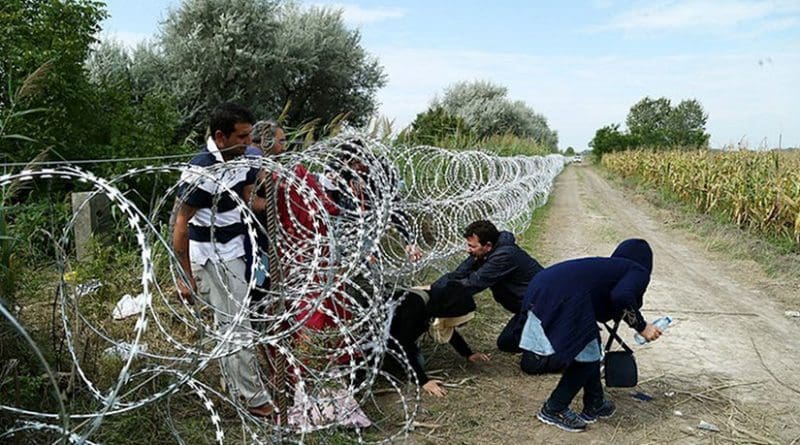Hungary Claims It Was Forced To Build Border Fence
By EurActiv
By Nicole Sagener*
(EurActiv) — Physical barriers are the only way Hungary can secure its borders, according to the country’s Minister for Foreign Affairs, Péter Szijjártó, and Budapest still maintains its opposition to refugee distribution quotas. EurActiv Germany reports.
“Hungary is attacked constantly, quite unjustifiably,” said Szijjártó. The Hungarian minister attended a migration conference in Berlin on Monday (4 April) and used his time at the podium to defend his country’s policy, which has shown an unwillingness to participate in the distribution of refugees and last autumn included the building of border fences.
Viktor Orbán’s refugee policy has come in for wide-ranging critcism as a result. Instead of pursuing quotas, Szijjártó clarified that Europe should be doing its utmost to ensure current regulations are fulfilled. The foreign minister asked: “How can the Schengen codex be fulfilled when thousands of migrants cross the borders every day?” He added that he was at a loss when trying to understand why Hungary is criticised, when it is just trying to adhere to the codex.
Alexander Graf Lambsdorff (FDP) also attended the Berlin conference and disputed Szijjártó’s stance by citing Schengen’s emergency measures that can be activated in times of crisis: “These rules come into play when, as things are now in Italy and Greece, emergencies arise.” The current crisis, where thousands of people are leaving third countries bound for Europe, falls under the emergency measures’ criteria, Lambsdorff added.
Hungary has remained unconvinced by the clause in the Schengen agreement that allows for the temporary reintroduction of border controls in specific circumstances.
Szijjártó highlighted that his country takes no pleasure from building its fences and continued to defend Viktor Orbán’s decision to authorise their construction. “We had no other choice than to build those physical barriers.” A move, he added, that has benefitted Germany. The minister explained that Hungary has so far spent 25% of its gross national product on securing its borders with Croatia and Serbia so that “no more irregular migrants reach Germany”.
Szijjártó also confirmed that Hungary remains opposed to the enforced distribution of refugees under the EU’s controversial quota system. “Mandatory quotas within the EU don’t make sense,” he said.
Hungary, the Czech Republic, Slovakia and Romania all agreed at a meeting of EU interior ministers at the end of September to oppose the distribution of 120,000 refugees. In December, Budapest filed a lawsuit with the European Court of Justice against the EU’s decision.
Szijjártó explained that Hungary’s stance is based on the notion that any people relocated to the Central European country would not stay there long and would seek to move onto a more attractive country such as Germany as soon as possible. Whether an effort to harmonise rules on the treatment of refugees across the bloc, as suggested by Commission Vice-President Kristalina Georgieva during the conference, could change Hungary’s approach to refugees, was left open by the foreign minister.
What Hungary wants to achieve from its planned referendum on the issue, announced in February, also remains to be seen. The question is likely to be: “Do you want the EU to determine the binding settlement of non-Hungarian citizens in Hungary without the parliament’s consent?”

